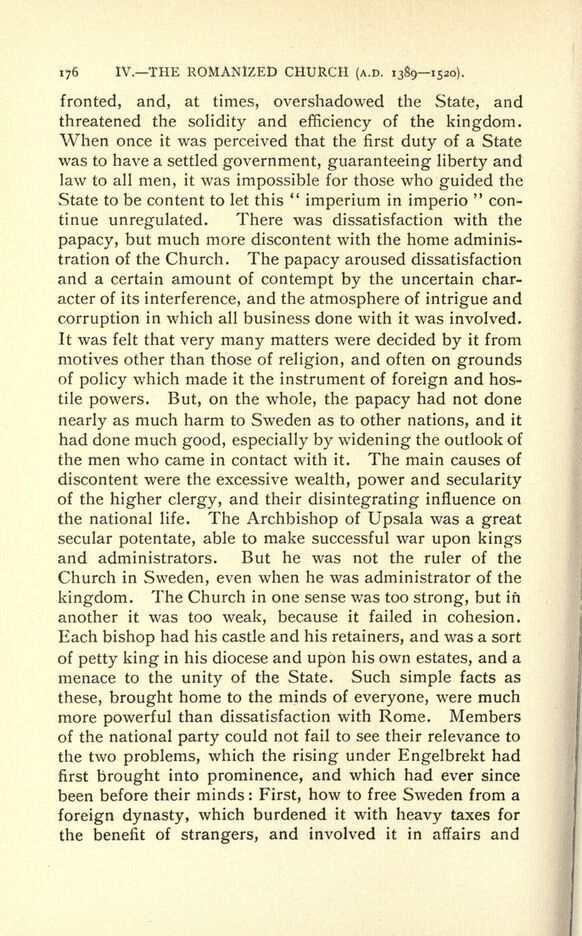
Full resolution (JPEG) - On this page / på denna sida - IV. The Romanized Church under the Union Sovereigns (1389—1520 A.D.)

<< prev. page << föreg. sida << >> nästa sida >> next page >>
Below is the raw OCR text
from the above scanned image.
Do you see an error? Proofread the page now!
Här nedan syns maskintolkade texten från faksimilbilden ovan.
Ser du något fel? Korrekturläs sidan nu!
This page has never been proofread. / Denna sida har aldrig korrekturlästs.
i;6 IV. THE ROMANIZED CHURCH (A.D. i
3S9 1520).
fronted, and, at times, overshadowed the State, and
threatened the solidity and efficiency of the kingdom.
When once it was perceived that the first duty of a State
was to have a settled government, guaranteeing liberty and
law to all men, it was impossible for those who guided the
State to be content to let this
"
imperium in imperio
"
con
tinue unregulated. There was dissatisfaction with the
papacy, but much more discontent with the home adminis
tration of the Church. The papacy aroused dissatisfaction
and a certain amount of contempt by the uncertain char
acter of its interference, and the atmosphere of intrigue and
corruption in which all business done with it was involved.
It was felt that very many matters were decided by it from
motives other than those of religion, and often on grounds
of policy which made it the instrument of foreign and hos
tile powers. But, on the whole, the papacy had not done
nearly as much harm to Sweden as to other nations, and it
had done much good, especially by widening the outlook of
the men who came in contact with it. The main causes of
discontent were the excessive wealth, power and secularity
of the higher clergy, and their disintegrating influence on
the national life. The Archbishop of Upsala was a great
secular potentate, able to make successful war upon kings
and administrators. But he was not the ruler of the
Church in Sweden, even when he was administrator of the
kingdom. The Church in one sense was too strong, but in
another it was too weak, because it failed in cohesion.
Each bishop had his castle and his retainers, and was a sort
of petty king in his diocese and upon his own estates, and a
menace to the unity of the State. Such simple facts as
these, brought home to the minds of everyone, were much
more powerful than dissatisfaction with Rome. Members
of the national party could not fail to see their relevance to
the two problems, which the rising under Engelbrekt had
first brought into prominence, and which had ever since
been before their minds :
First, how to free Sweden from a
foreign dynasty, which burdened it with heavy taxes for
the benefit of strangers, and involved it in affairs and
<< prev. page << föreg. sida << >> nästa sida >> next page >>